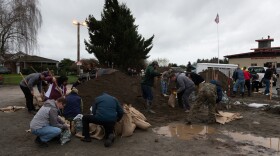Low numbers of Chinook salmon expected to return to the Columbia River this summer have led state and tribal officials to close that fishery until Aug. 1. They’ve also announced new restrictions on Puget Sound Chinook.
The limits come as local officials set the fishing season for 2019-20 after months of negotiation in a process known as "North of Falcon."
The Washington Department of Fish and Wildlife says fishermen can take solace in healthier returns of coho in many areas of the state — especially in the ocean and on the Columbia River.
But summer Chinook returns on the Columbia are expected to be too low to allow fishing through August. Kyle Adicks, Fish and Wildlife policy lead, says they’re estimating a return only in the mid-30,000 range.
“And we’ll be doing everything we can to get those summer Chinook up the river,” he said.
However, the state will allow salmon anglers to catch fall Chinook on the Columbia.
Additionally, several popular king fisheries will close due to poor projected returns of Puget Sound Chinook on three runs:the Stillaguamish, the Nooksack and mid-Hood Canal. San Juan Islands will close in August and Admiralty Inlet will close in January. Both Deception Pass and Port Gardner will be closed December and January.
“That will probably provide some benefit to killer whales,” Adicks said. “Some areas that are now closed to all salmon fishing overlap with areas that the killer whales are known to forage.”
Fish and Wildlife says these closures are meant to meet conservation goals. But they also will indirectly benefit the Southern Resident orcas, by minimizing boat presence and noise as well as competition for scarce Chinook salmon, which is the preferred and primary food source for the endangered, fish-eating whales.







